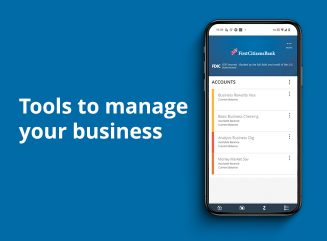Digital banking for business
Seamlessly access all of your accounts from one place with First Citizens Digital Banking for business.

Invest how you want, when you want, in real time with Self-Directed Investing.

Seamlessly access all of your accounts from one place with First Citizens Digital Banking for business.
We're committed to serving companies as they expand and succeed. The proof is in our success stories.
December FOMC meeting commentary: Available now
This month, the Fed lowered interest rates by another 0.25%. Read highlights and key takeaways from the Making Sense team.













Showing 1 - 12 of 12 results
This material is for informational purposes only and is not intended to be an offer, specific investment strategy, recommendation or solicitation to purchase or sell any security or insurance product, and should not be construed as legal, tax or accounting advice. Please consult with your legal or tax advisor regarding the particular facts and circumstances of your situation prior to making any financial decision. While we believe that the information presented is from reliable sources, we do not represent, warrant or guarantee that it is accurate or complete.
Third parties mentioned are not affiliated with First-Citizens Bank & Trust Company.
Links to third-party websites may have a privacy policy different from First Citizens Bank and may provide less security than this website. First Citizens Bank and its affiliates are not responsible for the products, services and content on any third-party website.
First Citizens Bank is a Member FDIC and an Equal Housing Lender icon: sys-ehl.
NMLSR ID 503941

Treasury & Cash Management
Electronic Bill Presentment & Payment
Investment & Retirement Services
Community Association Banking
Equipment Financing & Leasing
Credit Cards
Merchant Services
Email Us
Please select the option that best matches your needs.
Customers with account-related questions who aren't enrolled in Digital Banking or who would prefer to talk with someone can call us directly.